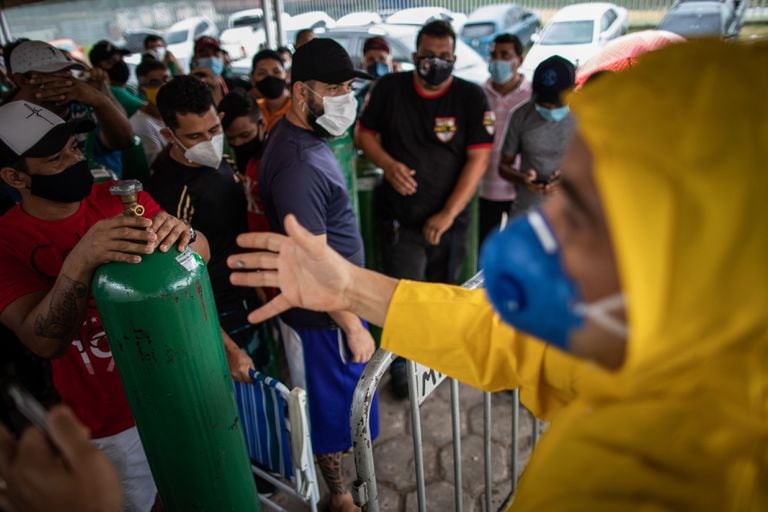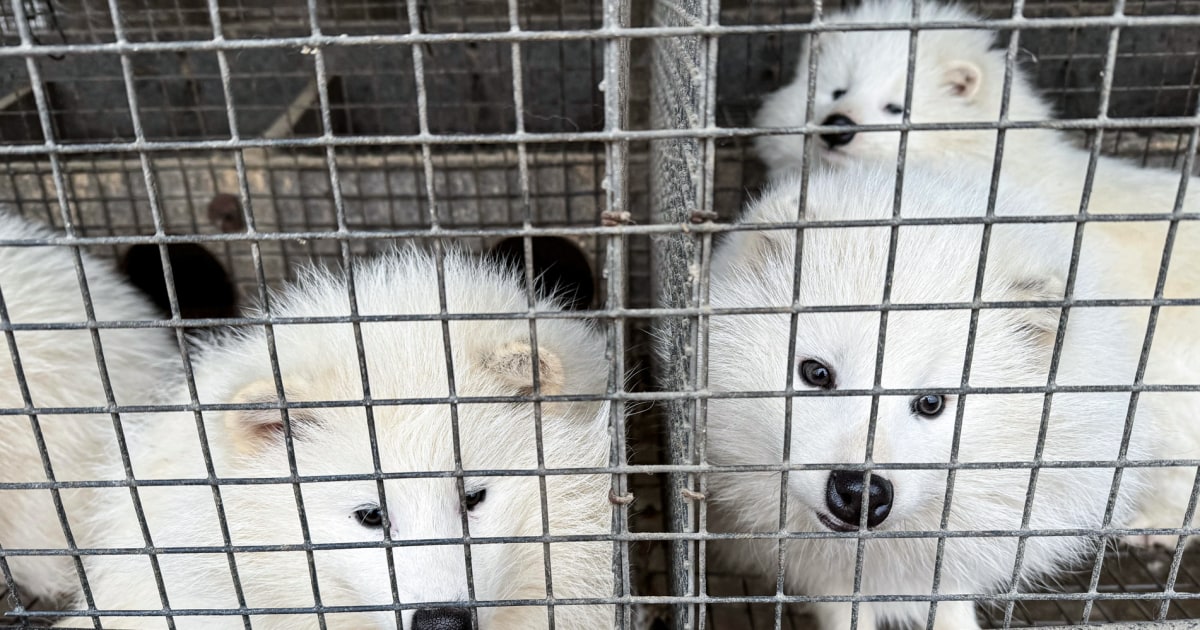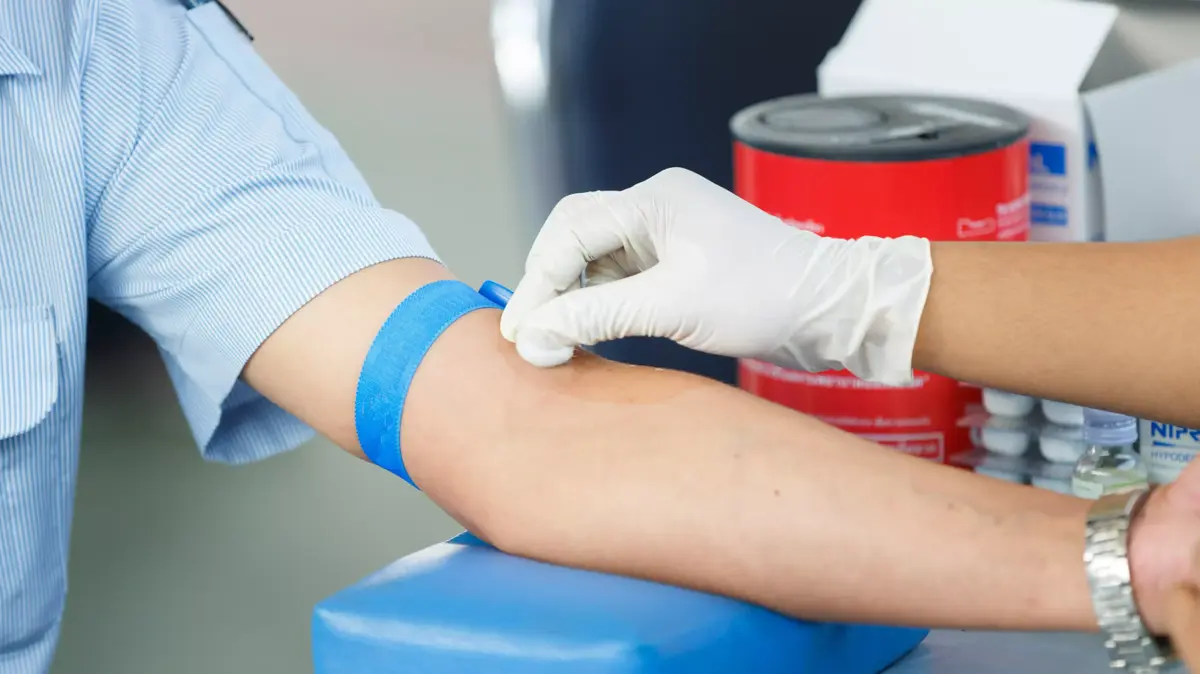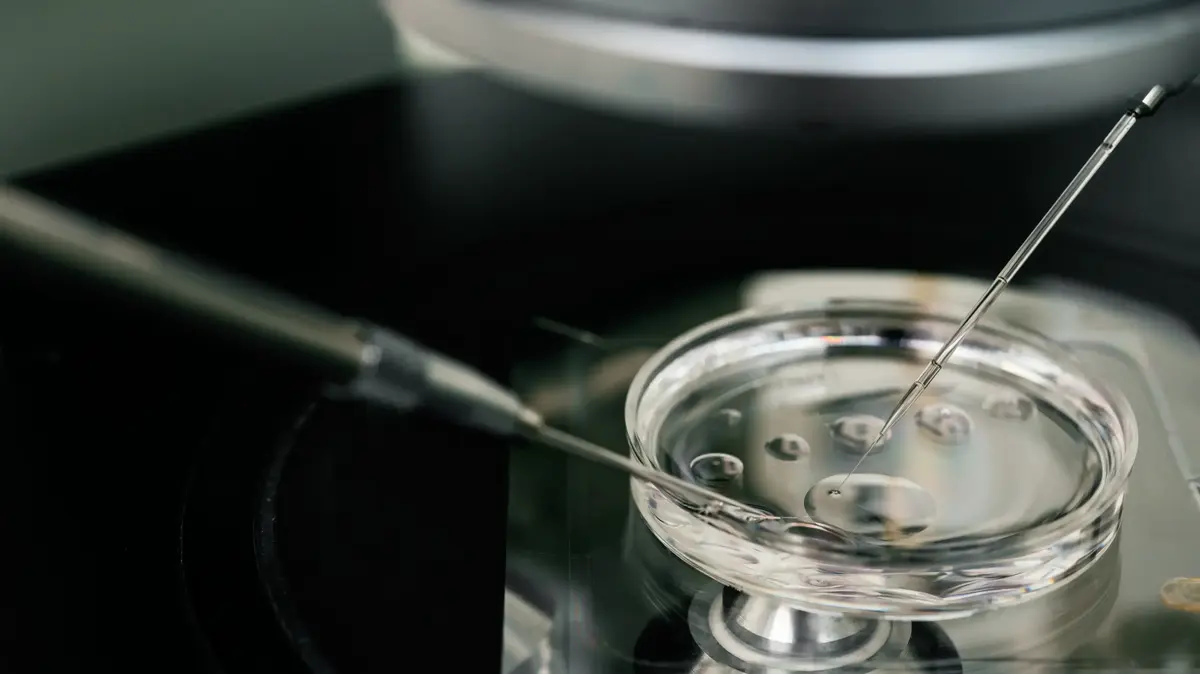Relatives of coronavirus patients wait in line to refill their oxygen tanks in the city of Manaus, on January 19.RAPHAEL ALVES / EFE
While the world is concerned about the impact of the new, potentially more contagious strains of the coronavirus, Brazil does not know which variants of the virus circulate in its territory.
The country does few tests, and is capable of genetically sequencing and analyzing a very small volume of these tests.
This is a reflection of the little investment that has historically been made in science.
Mutations are common and most do not cause much concern.
But so-called genomic surveillance is important, and even more so during a pandemic.
It is what indicates, for example, if there are more contagious or lethal strains and if they can escape the protection that vaccines provide.
It also indicates if it is necessary to improve the tests so that they continue to be able to confirm infections.
Last week, Japan identified a new strain of the virus in travelers from the State of Amazonas, where the situation is increasingly serious: with the advance of covid-19, the city of Manaus suffers a crisis in the supply of oxygen to the hospitals.
Identifying the Brazilian variant of the coronavirus exemplifies the country's difficulty in controlling mutations.
Brazil performs a hundred times less genomic sequencing, analysis of the composition of complete genomes of the virus, than the United Kingdom, a world reference in this field.
Late last year, British scientists quickly spotted a potentially more contagious variant.
At the moment, scientists still cannot say to what extent the new variant of the coronavirus that has been detected in Manaus is responsible for the second collapse of the health system in the State of Amazonas, although there is a great possibility that this has had an influence.
When Japan issued the alert on January 10 about the Manaus variant, the group of researchers from the Oswaldo Cruz public foundation (Fiocruz), which works in Amazonas doing genomic surveillance, had just completed the sequencing of some November samples.
Since March 2020, the group has been working simultaneously on genomic sequencing and diagnosis through clinical analysis.
The first big wave of the disease overwhelmed researchers, who spent three months with no progress in surveillance.
Only when the cases decreased was the group able to resume its activities and re-analyze samples from virtually all municipalities.
With the Japanese alert, these researchers have compared the samples from that country with the sequencing of November and have confirmed that the origin of this lineage - potentially more contagious - was the same as that of the Amazon.
That was surprising.
As we had the sequencing until November, we saw that it had originated in the same group, but with many mutations in a short period of time ”, says Felipe Naveca, researcher and Vice Director of Research and Innovation at the Leônidas & Maria Deane Institute (ILMD / Fiocruz Amazonia).
Now, the group is working on sequencing the virus in samples taken from patients who were infected in December to see if, at the end of last year, this variant, which has mutations similar to those in South Africa and the United Kingdom, was already in circulation. , and others of which we still do not know its impact.
Other studies have described the mutations that have been found in these countries and so far their greater contagious power has been indicated in relation to the coronavirus identified in Wuhan (China) in December 2019, but the clinical picture of the patients does not seem to be more serious, says Naveca.
The UK government, however, said on Friday that there are signs that the new variant may be more lethal.
"Probably this new variant has acquired mutations that could be associated with a faster contagion, which escapes the antibodies, but also with another set of mutations that we still do not know exactly what they do", explains scientist Nuno Faria, from the Centro Brasil- United Kingdom for Arbovirus Discovery, Diagnosis, Genomics and Epidemiology (Cadde), which has been working with researchers from Fiocruz.
Scientists continue to study whether the new variant is more contagious and whether it can escape the immune response of those who have already had COVID-19.
Fiocruz detected last Wednesday the first case of reinfection by the new variant of the coronavirus in the State of Amazonas.
Other factors that may explain the worsening of the pandemic at this time are also being studied, such as contagion during the holidays and the seasonality of diseases caused by respiratory viruses.
Between November and April, the rainy season, historically there is an increase in viral infections in the State.
“Since November, we are seeing an increase that is already starting to scare.
The end of the year festivities and the protests to reopen commerce have coincided with the circulation of a more contagious variant ”, explains Naveca.
'Blackout' in genomic sequencing
The variant worries the Brazilian scientific community, especially because of the country's context, which has never been able to apply effective policies to control contagion and, with the worsening of the pandemic, is under great hospital pressure.
The case of the State of Amazonas is an example of a kind of coronavirus genomic data blackout in Brazil.
During the pandemic, the country has come to strengthen the networks that work with genetic sequencing.
There are several groups that work in this regard, linked to the Ministries of Health and Science and Technology, some in collaboration with Cadde.
Even so, only 0.024% of confirmed cases in Brazil have been sequenced, while in the United Kingdom this rate reaches 5% and in South Africa 0.256%.
“Brazil does few tests, and even less sequencing.
All this is a reflection of a historical lack of investment ”, explains Navarro.
The resources that went to science last year, when the pandemic broke out, are 65% lower than in 2015, when cuts in the area began.
The outlook for this year is also dramatic.
"In Brazil, we have the resources to make a limited number of samples," agrees researcher Ana Teresa Vasconcelos, from the National Laboratory for Scientific Computing.
The Fiocruz group in the State of Amazonas has sequenced 190 genomes to date.
"We could do more, but we have the diagnostic work and the resources are still far from being necessary," explains Naveca.
The problems in scaling up work go beyond a lack of equipment.
“The bottleneck is the investment in reagents and personnel.
I would say that, in sequencing, we are at a medium to low level ”, says the researcher.
The devaluation of the real against the dollar in recent months has also hampered the work of the research group, since all the material they need is imported.
“With the resources we have, we can buy half of what we bought before.
In the Amazon, we suffer a lot from that, ”he says.
Naveca says that last year the group had practically no materials and had to ask the Air Force to bring them.
“We need to import materials and many are not available for immediate delivery.
Importing them can take 30 to 60 days ”, Vasconcelos adds.
In recent months, genomic surveillance work in Brazil has been delayed, according to Fernando Spilki, researcher and professor of Virology at Feevale University and coordinator of the Corona-omic Network, created by the Ministry of Science, Technology and Innovations during the pandemic to direct sequencing efforts.
“There was a movement at the beginning that generated more sequencing, with the effort of international networks.
Afterwards, there were not so many and now we are beginning to make up for lost time, ”he says.
Spilki claims that he is working to expand the network and the number of people involved in this work to provide faster responses.
“We don't have the ability to sequence at the rate of the UK, which has reached 7,000 sequences in one day.
But we are working to expand our capacity.
At this moment, we are concerned, sequencing as many genomes as we can and seeing which ones may concern us, "he adds.
This surveillance is what allowed, for example, to identify a new strain in Rio de Janeiro in July, which has predominated in the new cases of covid-19 in the State of Rio Grande do Sul.
This surveillance allows the route of the virus to be traced, but it is also important to know whether existing diagnostic tools need to be improved to detect new cases.
“If a mutation occurs in a region of the virus that the test recognizes, it can give a false negative.
With this information, it is possible to adjust it and make the test work again ”, explains Naveca.
In relation to vaccination, genomic surveillance is also crucial, because mutations can develop that escape the protection offered by the immunizer, which would then have to be improved.
"Until now, none of the variants diminish the efficacy of the vaccines", warns Ana Teresa Vasconcelos.
The expert explains that mutations have been observed in the Spike protein, where several vaccines act, but that getting to interfere with this protection is more complex: “And even if some very harmful [mutation] is identified, these vaccines are manufactured in such a way that they can be adapt ”, he reflects.
Initiating vaccination of the population can reduce the volume of mutations.
“The less the virus circulates, the fewer people will transmit it.
To survive, it has to continue infecting it, ”explains Vasconcelos.
In this sense, a contagion containment policy would be important.
“The measures in Brazil are very light and we are leaving a lot of room for the virus to evolve.
We urgently need, in addition to more restrictive measures, to be vaccinated.
We need to contain this so that the virus does not continue to diversify and we have a problem in the future with vaccines, "concludes Spilki.








/cloudfront-eu-central-1.images.arcpublishing.com/prisa/LQPWPAKRSFAOTLDKLCXHU5HOLU.jpg)
